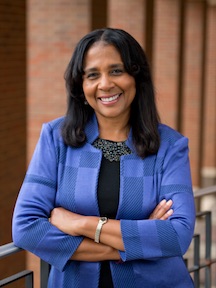By Joe Slama
Understanding Angela Walker Franklin’s role as president of Des Moines University requires discussing a wide range of topics — which is fitting, given her foundation in the liberal arts.
“The love of learning is the key to success, to be able to always think about evolving and growing and learning more,” she said.
Franklin is highly specialized — a clinical psychologist by training, she has spent decades in university leadership, first at Morehouse School of Medicine in Atlanta and then at Meharry Medical College in Nashville. Currently president of DMU, the second-oldest school of osteopathic medicine in the nation, she now oversees the training of more than 1,500 graduate students in the health sciences.
But to Franklin, who in 2011 was the first woman and first person of color to fill the presidency at DMU, practicing healthcare isn’t only about medical knowledge — it also includes a foundation in the liberal arts and sciences.
She first gained her grounding in liberal studies as an undergraduate at Furman University in Greenville, South Carolina., where she graduated ΦΒΚ with a B.A. in Psychology in June 1981. After earning her Master’s and Ph.D. in Clinical Psychology at Emory University in Atlanta, Franklin launched her career in higher education as an assistant professor at Morehouse in 1986.
Franklin called the liberal arts and sciences “a philosophy that is the backdrop on which I built my career.” Studies across a range of disciplines give a sort of “big picture view” that informs her approach to leadership, she explained.
“I always envision leadership as someone who can see the forest, the trees, where they’re planted, where the roots go, and a very big view of what it takes to fertilize and nourish,” she said. “Focus on the individuals that are part of what makes an organization work.”
She emphasizes “servant leadership,” describing herself as “a hands-on, more engaged, interact with everyone” type. This philosophy led to re-structuring the administration at Des Moines; rather than a cabinet, Franklin has an “executive leadership team” that “represent key focuses of leadership around the campus,” she said. She’s published a book on leadership, entitled An Unconventional Journey, an Unlikely Choice. The memoir chronicles her rise from small-town roots to her position today and lays out the lessons that path brought.
A “big picture” mentality also guides her approach to the DMU student body. She described the “ideal candidate for medical school” as students not only prepared to handle rigorous courses in the sciences, but also with a diverse background.
“If you were to ask what faculties of institutions like ours are looking for, for the next generation of health care providers, they’re looking for the student to have a broader range of experiences,” she said. “Someone with that stronger liberal arts background and foundation in the liberal arts and the sciences is perceived to have a broader view.”
“When we talk to prospective students, we encourage them to show a sign of the other things that they enjoy,” she said. “Those are the more unique experiences that they bring to the table.”
Diversity of all types, not only academic, guides much of Franklin’s approach to leadership. Prominent among the values she has promulgated for the University is inclusiveness, which she sees as integral to health care practice in the modern age.
“Difference is celebrated here,” she said, noting that under her leadership, the University has embraced a wide definition of diversity, created the position of Chief Diversity Officer, and developed curricula designed to produce “highly competent and compassionate graduates.”
“People do well, do better sometimes, when they have a provider and a clinician, the person they go to for their care, who understands their condition or may even look just like them,” she said. “People have a different level of respect and appreciation for the provider that comes from a similar background.”
Patient well-being is not her only concern, but student health also, particularly in rigorous medical studies.
“Wellness is also a core value,” Franklin said. A favorite elective class at Des Moines is a healthy cooking class, and the University has earned platinum-level recognition from the Wellness Council of America over two consecutive years.
“We’ve been very deliberate in our efforts to create a campus environment that focuses on good health and well-being, including mental health,” Franklin said. This culture is an “institutional imperative,” and “has to start from the top” levels of leadership with student participation, she explained.
Medical school “is overwhelming sometimes, but we recognize that,” Franklin explained, “and we want to give the most support we can give you to make sure you get to the other side and march across the stage.”
DMU was founded in 1898 by husband-wife team Doctors Summerfrield Saunders Still and Ella Still. When Franklin came on as the fifteenth president, she found that much of the school’s history was unrecorded outside of archives and an unfinished book.
She commissioned a project to finish this research, producing a book to show “the good, the bad, and the ugly” of the school’s story, titled Now is the Time, Des Moines is the Place. The book tells “a fascinating story of endurance,” and Franklin warns that if institutional history is ignored, “you’re selling yourself short.”
Franklin recalls fondly her induction into ΦBK, “an honor still,” saying membership is “all about quality and excellence and education. The love of learning is to me a foundation.”
Joe Slama, a senior at Truman State University studying Classics, was inducted into Phi Beta Kappa in spring 2017 while studying and working in Rome. Truman is home to the Delta of Missouri chapter of Phi Beta Kappa.




